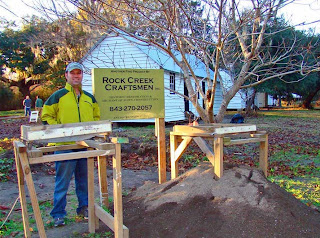Members of the Leach family have lived and worked at Magnolia Plantation for generations Their family story is an important part of a new project at Magnolia Plantation to tell the history of the men and women who have worked here for over three centuries.
Their family story is an important part of a new project at Magnolia Plantation to tell the history of the men and women who have worked here for over three centuries.
At 86, Mr. Johnny Leach is still an active member of the Magnolia Gardens staff. Mr. Isaac Leach (age 50) keeps the gardens beautiful for visitors by working on insect and disease control on the many historic plant species, in addition to maintaining the properties numerous ponds. Jackson Leach (age 18) works in grounds keeping and will be a historical interpreter when the newly restored cabins are open to the public.
Isaac, Jackson, and Mr. Johnny Leach revisited their former home on what they refer to as "the street" today to see the work that has been done to restore the cabins.
 Mr. Leach (on the left) shows his son and grandson the addition to the old family cabin he built by himself over 50 years ago. He rigged a special rope pulling system to lift the metal sheets onto the roof by himself. Isaac Leach remembers a large wooden barrel that was used to white wash the cabin many years ago when he was a boy. All three men lived in the cabin, although Jackson was only 2 when he moved with his family to a new home.
Mr. Leach (on the left) shows his son and grandson the addition to the old family cabin he built by himself over 50 years ago. He rigged a special rope pulling system to lift the metal sheets onto the roof by himself. Isaac Leach remembers a large wooden barrel that was used to white wash the cabin many years ago when he was a boy. All three men lived in the cabin, although Jackson was only 2 when he moved with his family to a new home.
 New staff members meet with the Leach's at "the Street". Historical interpreter Preston Cooley and Managing Site Historian D.J. Tucker discuss plans for the historical sites opening in February with Jackson, Johnny, and Isaac Leach.
New staff members meet with the Leach's at "the Street". Historical interpreter Preston Cooley and Managing Site Historian D.J. Tucker discuss plans for the historical sites opening in February with Jackson, Johnny, and Isaac Leach.
I'll post today's plein air drawing from the site tomorrow.
As both an artist and a former Park Ranger Historian with the National Park Service who interpreted the history of Fort Moultrie and Fort Sumter in the 70's, I'm enjoying meeting those who are involved in the development of this historic site. When it's completed, Slave Cabin Row (aka "The Street") will be a unique addition to the history of the Lowcountry, telling the story of how the lives of workers on a southern plantation changed through the years from the colonial era up to the present.
 A long white bridge crossing the dark waters of a cypress pond is a favorite view of visitors to Magnolia Gardens. The graceful curves of the bridge contrast with the straight trunks of cypress trees reflected in the dark water. It's a memorable sight.
A long white bridge crossing the dark waters of a cypress pond is a favorite view of visitors to Magnolia Gardens. The graceful curves of the bridge contrast with the straight trunks of cypress trees reflected in the dark water. It's a memorable sight. The painting is one of six artworks I have entered in the 2009 Winter Garden Festival Art Show at Magnolia Gardens Jan. 24 - Feb. 28th. The Plantation Gallery Gift Shop is located on the ground level of the Manor House.
The painting is one of six artworks I have entered in the 2009 Winter Garden Festival Art Show at Magnolia Gardens Jan. 24 - Feb. 28th. The Plantation Gallery Gift Shop is located on the ground level of the Manor House.




 Few things are as relaxing as sitting under an ancient live oak watching the Spanish moss sway in the breeze as sunlight shines through the leafy canopy.
Few things are as relaxing as sitting under an ancient live oak watching the Spanish moss sway in the breeze as sunlight shines through the leafy canopy.
 I was back out at
I was back out at  second show will be a Juried Exhibition and sale in the Carriage House at Magnolia Gardens entitled "The Girl with the Gold Earring". Magnolia Plantation is sponsoring this exhibit to highlight a recently found gold artifact at an archeological dig on the plantation. This show will be on display from Feb. 2 - Feb. 19, 2009.
second show will be a Juried Exhibition and sale in the Carriage House at Magnolia Gardens entitled "The Girl with the Gold Earring". Magnolia Plantation is sponsoring this exhibit to highlight a recently found gold artifact at an archeological dig on the plantation. This show will be on display from Feb. 2 - Feb. 19, 2009. painters from The Charleston Artist Guild
painters from The Charleston Artist Guild  Their family story is an important part of a new project at
Their family story is an important part of a new project at Mr. Leach (on the left) shows his son and grandson the addition to the old family cabin he built by himself over 50 years ago. He rigged a special rope pulling system to lift the metal sheets onto the roof by himself. Isaac Leach remembers a large wooden barrel that was used to white wash the cabin many years ago when he was a boy. All three men lived in the cabin, although Jackson was only 2 when he moved with his family to a new home.
Mr. Leach (on the left) shows his son and grandson the addition to the old family cabin he built by himself over 50 years ago. He rigged a special rope pulling system to lift the metal sheets onto the roof by himself. Isaac Leach remembers a large wooden barrel that was used to white wash the cabin many years ago when he was a boy. All three men lived in the cabin, although Jackson was only 2 when he moved with his family to a new home. New staff members meet with the Leach's at "the Street". Historical interpreter Preston Cooley and Managing Site Historian D.J. Tucker discuss plans for the historical sites opening in February with Jackson, Johnny, and Isaac Leach.
New staff members meet with the Leach's at "the Street". Historical interpreter Preston Cooley and Managing Site Historian D.J. Tucker discuss plans for the historical sites opening in February with Jackson, Johnny, and Isaac Leach.



 Here are photos of my mortar and pestle and spinning wheel (circa 1800) in the cabin. Both are similar to those which would have been used on the plantation in the Colonial Era.
Here are photos of my mortar and pestle and spinning wheel (circa 1800) in the cabin. Both are similar to those which would have been used on the plantation in the Colonial Era.
 I returned to the tidal creek at Poplar Grove I tried to paint last year.
I returned to the tidal creek at Poplar Grove I tried to paint last year. 


 "Misty Morning on the Creek"
"Misty Morning on the Creek"